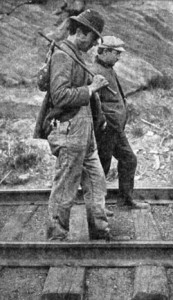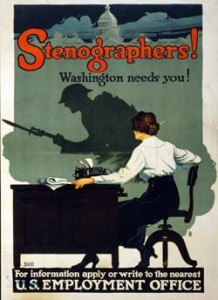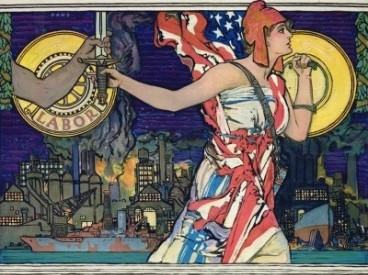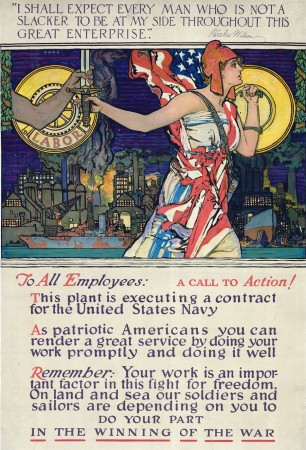The high unemployment of the past few years has led to the demand by some Americans that the government “create jobs.” Opponents argue that this is not the role of government; no Federal or State agency could put everyone to work.
Yet nine state governments did exactly that between 1917 and 1918. Each one passed a mandatory-work law to support national defense after America had entered the First World War.
Massachusetts’ Compulsory Work Law, which was typical of these programs, announced the new law in these words:
The object of this act is to require [able-bodied men] to engage in some useful occupation.
All able-bodied males between the ages of 18 and 50 must work 36 hours each week at some useful occupation…
Persons possessed of independent incomes that may not make it necessary for them to work for their own support… [are] included within the scope of the act.
Persons failing to comply with the provisions of the law are liable to a penalty of a $100 fine, three months in jail, or both.
An article in the September, 1917, Country Gentleman reported how the program worked in Maryland.
By proclamation… every able-bodied man in Maryland not regularly employed was ordered to register [with the Compulsory Work Bureau].
There is a fifty-dollar penalty for failing to register, and the man who can’t pay this fine must work it out under special laws passed as emergency measures during the war.
Three classes of work have been designated by the governor as necessary for the protection and welfare of the state—work on farms and in orchards, work in canneries, work on state and country roads and on the streets of Baltimore.
A man placed in any one of these fields of work who refuses to do that work is liable to a fine of not more than $500, or imprisonment for not more than six months, or both.
The state expected that the incorrigibly idle would refuse to work so they could take the maximum penalty and spend a quiet, comfortable winter in jail. But the head of the state’s Compulsory-Work Bureau was ready:
“We’re going to upset that little scheme, for we have an emergency law that lets us put a man on the state roads to work out his fine.”
There was no denying that the U.S. was facing a critical shortage of labor—and everything else—when it entered the war. After joining the Allied forces, it urgently needed to build an army of 4 million men, arm them, and transport them to Europe as quickly as possible, even though we had almost no soldiers, weapons, or ships.
Making the guns and ammunition for this army would be an immense task, but so would feeding it. Farmers were urged to put all available acreage under the plow. Consequently—
There is a crying need… for more farm labor. The shoe began to pinch the farmer long before the United States actively entered the war. Our munitions plants, enlarging their capacities for war orders… have been working at top speed for several years [and] have been steadily draining farm labor from the fields to the cities.
Legislators believed the labor shortage would be solved by these mandatory-work laws. But some Americans hoped the laws would have the broader effect of banishing vagrants and hobos from the American countryside and re-instilling a strong, new work ethic. According to a 1918 article in the Post, there was a “universal recognition” among Americans:

the idler, the loafer, must go. The industrial slacker, the drone in the hive of a busy nation, is today a doomed man.
It is, indeed, a far-reaching revolution in the spirit of a people that in so short a time the mere shirker from work should be looked upon with as much contempt and treated almost as much like a criminal as an evader of the military draft.
Never were there so few idlers in this country as now. The beggar has gone from the city street, the tramp from the kitchen door and the hobo from the railroad track.
Even before the war there could hardly have been more than five or six million men, from age eighteen to sixty-two, who were not engaged in “gainful occupations,” as the census puts it. It is doubtful if much more than a million able-bodied [men] are chronically, habitually and professionally idle.
A million loafers may not seem many in a nation of a hundred million people. But the nation is now in no mood to permit even these few to get in its way.
Then, as now, the law seemed to violate civil rights. But it was, at least, being fairly prosecuted.
It is clear that no compulsory-work law would stand any chance of being enforced unless it were used against the idle rich as well as against the idle poor.
The Post reported the case of a “Mr. B.” who was young, independently wealthy, and well connected. His friends gave him a token job to avoid prosecution, but the Compulsory Work Bureau found he only showed up a few hours a week. Despite the pressure from his influential family, he was re-arrested. Before he could be sent to a state-made job, he joined the army.
[So] the rich idler who has inherited sufficient wealth to live in luxury is placed in the same class as the ordinary vagrant.
No longer may the scions of prominent families languidly gaze from the windows of their Fifth Avenue clubs upon the man who toils… They must really work.

It’s hard to tell the overall effect of the mandatory-work laws. We do know, however, that from 1917 to 1918 the unemployment rate dropped from 4.5% to 1.4%.
After the war, all the compulsory-work laws were declared illegal (though a 1916 Supreme Court ruling declared they were constitutional, even in peacetime).
In the long run, the labor shortage had a profound effect on working Americans. The war-time government was so desperate for war workers that, for the first time, it supported the claims of organized labor and forced its suppliers into binding arbitration with unions. It pressured employers to raise wages and hire minorities.
When faced with a severe labor shortage, both Federal and State government have shown they can be surprisingly innovative.
Become a Saturday Evening Post member and enjoy unlimited access. Subscribe now





Comments
I think every adult person should be responsible for their own existence. If they want to go on government assistance then they should be required to report to some kind of work program that generates some kind of financial return for the municipality that is providing the assistance.
The programs we have today that give benefits to people without them doing anything in return, are doing nothing more that creating the entitlement mentality. Which is nothing more than a spoiled child mentality through adulthood.
Furthermore we should have laws prohibiting people that live on welfare and in government housing from voting or having children. If they have children while on welfare then the children shouldn’t be covered. The parents will just have to share the food and housing that they have with their children.
All able bodied adults should
Be required to be job employed,
Private or public, and that would
Help keep the economy buoyed.
Mandatory work laws would make
The U.S.A. a better place.
Those who chose the work law to break,
Would do jail jobs in time and space.
We need to rid the nation of
Entitlements mentality.
To do that we must look to gov.
But alas, just taint gonna be.
Politicians sure won’t abide
Sure political suicide.